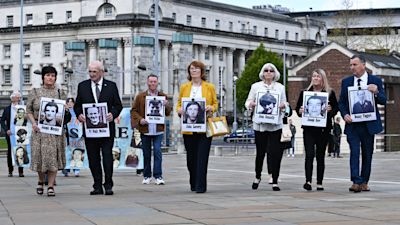Coroner finds Ballymurphy victims 'entirely innocent of any wrongdoing'

All 10 victims of the Ballymurphy massacre were “entirely innocent of any wrongdoing” and use of force by the Army was “unjustified”, a coroner has ruled.
There was applause at Belfast Coroner's Court as the findings were delivered following fresh inquests into the killings in west Belfast in August 1971.
A mother-of-eight and a Catholic priest were among those who died.
Presiding Coroner Mrs Justice Keegan acknowledged it was a chaotic time but ruled that the use of force by soldiers had been "disproportionate" in the nine deaths the Army was found to have been responsible for.
She ruled out any paramilitary involvement by any of those killed, and described them as "entirely innocent of any wrongdoing on the day in question".
There was applause within the courtroom as she made that pronouncement.
Ten fresh inquests were heard in terms of the five incidents in which they occurred.
Parish priest Father Hugh Mullan, 38, and Frank Quinn, 19, were shot in the Springfield Park area of Ballymurphy at around 9pm on 9 August.
Around the same time, outside an Army barracks at the Henry Taggart Hall in Divismore Park, Noel Philips, 19, Joseph Murphy, 41, Joan Connolly, 44, and Daniel Teggart, 44, were fatally wounded by gunfire.
The following day, Eddie Doherty, 31, died after being shot in the Whiterock Road as he came across an encounter between soldiers and protesters who had erected a barricade across the road.
In the fourth incident, on the third day of shooting, Joseph Corr, 43, and John Laverty, 20, were shot in the Whiterock Road area in the early hours of the morning. Mr Corr died from his injuries 16 days later.
And later that morning former soldier John McKerr, 49, was shot later in Westrock Drive, close to Corpus Christi Church as he took a break from maintenance work. He died from his injuries on 20 August.
Mrs Justice Keegan described the inquests as the longest running to date in Northern Ireland.
While outlining the context in which the deaths happened, in terms of the start of what has become known as the Troubles and the introduction of the policy of internment without trial on 9 August, she said she assessed each incident on its own facts.
The standard of proof used was on balance of probability.
She noted that, 50 years on, the deaths remain "stark" for the families.
Original inquests into the Ballymurphy deaths in 1972 returned open verdicts and the bereaved families subsequently pursued a long campaign for fresh probes to be held. New inquests began in 2018, with the final oral evidence heard last March. Eye-witnesses, forensic experts, former Sinn Féin president Gerry Adams and more than 60 former soldiers - including former head of the Army General Sir Mike Jackson - gave evidence at Belfast Coroner's Court. The families of those killed have long contended they were innocent, unarmed civilians shot by soldiers without justification.
Relatives took part in a church service on Monday ahead of the findings and described their feeling that Tuesday will be a hard and anxious day. Briege Voyle said the pain of losing her mother, Joan Connolly, was made even harder when misinformation was circulated that she had been a gunwoman.
Father Hugh Mullan was shot after he had crawled to waste ground where a man had been shot to administer the Last Rites.
His brother Patsy described him as simply wanting to help people.
"My brother was not involved in anything other than going out to help somebody," he said.
"He was a priest and anointed a man - as he left him to go and try and get an ambulance, he was shot."
The findings come on a day that the UK Government has vowed to end the cycle of legacy investigations in Northern Ireland, as the Queen’s Speech said measures will be brought forward to “strengthen” devolution.
Troubles victims and politicians across the island of Ireland voiced anger when plans for such a move were reported last week.
WATCH: The family of Father Hugh Mullan speak to Paul Reilly: